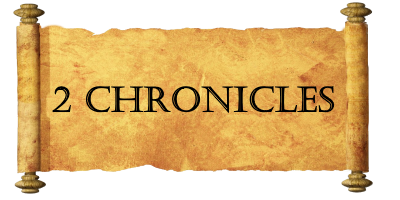Song of Solomon
דִּבְרֵי הַיָּמִים ב
2 the days words of

Introduction
The Book of Chronicles is a Hebrew prose work constituting part of Jewish and Christian scripture. It contains a genealogy starting from Adam, and a narrative of the history of ancient Judah and Israel until the proclamation of King Cyrus the Great (c. 540 BC).Chronicles is the final book of the Hebrew Bible, concluding the third section of Ketuvim, the last section of the Jewish Tanakh. It was divided into two books in the Septuagint, the Paralipoménōn (Greek: Παραλειπομένων, lit. "things left on one side").
In Christian contexts it is therefore known as the Books of Chronicles, after the Latin name chronicon given to the text by the scholar Jerome. In the Christian Bible, the books (commonly referred to as 1 Chronicles and 2 Chronicles, or First Chronicles and Second Chronicles) generally follow the two Books of Kings, and precede Ezra–Nehemiah; thus they conclude the history-oriented books of the Old Testament.
Contents
1. Solomon's wisdom (1)2. The building and inauguration of the temple (2-7)3. Solomon's wealth, the Queen of Sheba(8-9)4. The Kingdom Divided (10)5. The Kingdom of Judah (11-36)In the two final verses, identical to the opening verses of the Book of Ezra, the Persian king Cyrus the Great conquers the Neo-Babylonian Empire, and authorises the restoration of the Temple in Jerusalem and the return of the exiles.
Date, Author
Refer to 1 Chronicles.
The rest of this comprehensive Wikipedia article on the book can be read here.
An extract from BHFA Volume 5
2 Chronicles 6:2
וַאֲנִי בָּנִיתִי
I have built but I
In BHS, a footnote at the first word of this verse refers us to 1 Kings 8:13. There the same sentence starts with בָּנֹה בָנִיתִי which is the qal inf. abs. followed by the by the qal perf. 1cs of the same verb בָּנָה and together means, "I will surely build," as apposed to the "And I built" in the MT.
The note correctly points out that in Kings the original LXX is similar to the MT.
Note:
Actually, large parts of 2 Chr 1-6 are repetitions of parts of 1 Kgs 5-8.
An extract from BHFA Volume 5
2 Chronicles 36:9a
בֶּן־ שְׁמוֹנֶה שָׁנִים יְהוֹיָכִין בְּמָלְכוֹ
when his reign (began) Jehoiachin years eight son (old)
In BHS, a footnote at the second word of this verse suggests that we insert עֶשְׂרֵת which means, "ten." This would then agree with some versions of the LXX, and also with 2 Kgs 24:8 which has בֶּן־שְׁמֹנֶה עֶשְׂרֵה שָׁנָה meaning, "son (old) eight."
Except for KJV, all other major English translations follow the footnote's suggestion.
To motivate this they refer to 2 Kgs 24:15 which states that he had "wives," and to Jer 22:38 which states that he had "seed."
Counting in Hebrew
| Number | English Transcription | Hebrew |
|---|---|---|
| 1 | Echad | אֶחָד |
| 2 | Shtaim | שְׁנַיִם |
| 3 | Shalosh | שָׁלשׁ |
| 4 | Arba | אַרְבַּע |
| 5 | Hamesh | חָמֵשׁ |
| 6 | Shesh | שֵׁשׁ |
| 7 | Sheva | שֶׁבַע |
| 8 | Shmone | שְׁמֹנֶה |
| 9 | Tesha | תֵּשַׁע |
| 10 | Eser | עֶשֶׂר |